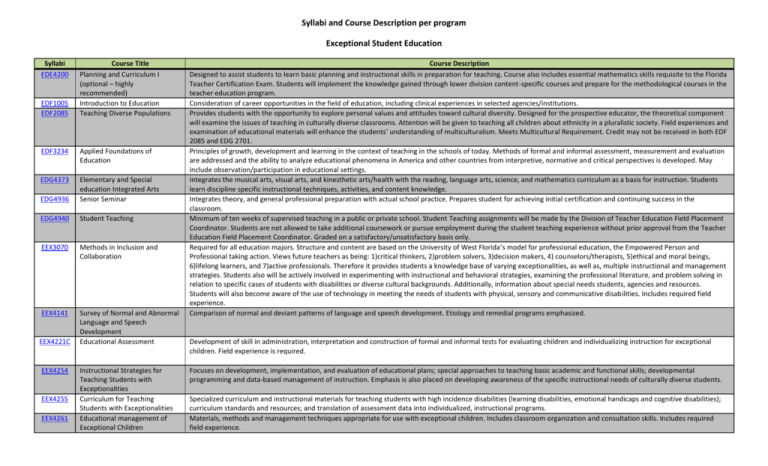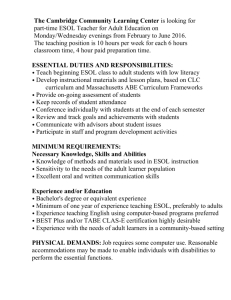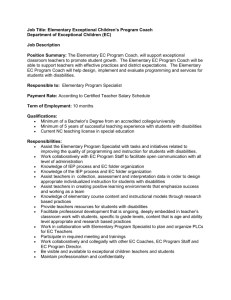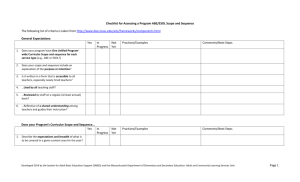Syllabi and Course Description per program Exceptional Student
advertisement

Syllabi and Course Description per program Exceptional Student Education Syllabi EDE4200 EDF1005 EDF2085 Course Title Planning and Curriculum I (optional – highly recommended) Introduction to Education Teaching Diverse Populations EDF3234 Applied Foundations of Education EDG4373 EDG4936 Elementary and Special education Integrated Arts Senior Seminar EDG4940 Student Teaching EEX3070 Methods in Inclusion and Collaboration EEX4141 Survey of Normal and Abnormal Language and Speech Development Educational Assessment EEX4221C EEX4254 EEX4255 EEX4261 Instructional Strategies for Teaching Students with Exceptionalities Curriculum for Teaching Students with Exceptionalities Educational management of Exceptional Children Course Description Designed to assist students to learn basic planning and instructional skills in preparation for teaching. Course also includes essential mathematics skills requisite to the Florida Teacher Certification Exam. Students will implement the knowledge gained through lower division content-specific courses and prepare for the methodological courses in the teacher education program. Consideration of career opportunities in the field of education, including clinical experiences in selected agencies/institutions. Provides students with the opportunity to explore personal values and attitudes toward cultural diversity. Designed for the prospective educator, the theoretical component will examine the issues of teaching in culturally diverse classrooms. Attention will be given to teaching all children about ethnicity in a pluralistic society. Field experiences and examination of educational materials will enhance the students’ understanding of multiculturalism. Meets Multicultural Requirement. Credit may not be received in both EDF 2085 and EDG 2701. Principles of growth, development and learning in the context of teaching in the schools of today. Methods of formal and informal assessment, measurement and evaluation are addressed and the ability to analyze educational phenomena in America and other countries from interpretive, normative and critical perspectives is developed. May include observation/participation in educational settings. Integrates the musical arts, visual arts, and kinesthetic arts/health with the reading, language arts, science, and mathematics curriculum as a basis for instruction. Students learn discipline specific instructional techniques, activities, and content knowledge. Integrates theory, and general professional preparation with actual school practice. Prepares student for achieving initial certification and continuing success in the classroom. Minimum of ten weeks of supervised teaching in a public or private school. Student Teaching assignments will be made by the Division of Teacher Education Field Placement Coordinator. Students are not allowed to take additional coursework or pursue employment during the student teaching experience without prior approval from the Teacher Education Field Placement Coordinator. Graded on a satisfactory/unsatisfactory basis only. Required for all education majors. Structure and content are based on the University of West Florida’s model for professional education, the Empowered Person and Professional taking action. Views future teachers as being: 1)critical thinkers, 2)problem solvers, 3)decision makers, 4) counselors/therapists, 5)ethical and moral beings, 6)lifelong learners, and 7)active professionals. Therefore it provides students a knowledge base of varying exceptionalities, as well as, multiple instructional and management strategies. Students also will be actively involved in experimenting with instructional and behavioral strategies, examining the professional literature, and problem solving in relation to specific cases of students with disabilities or diverse cultural backgrounds. Additionally, information about special needs students, agencies and resources. Students will also become aware of the use of technology in meeting the needs of students with physical, sensory and communicative disabilities. Includes required field experience. Comparison of normal and deviant patterns of language and speech development. Etiology and remedial programs emphasized. Development of skill in administration, interpretation and construction of formal and informal tests for evaluating children and individualizing instruction for exceptional children. Field experience is required. Focuses on development, implementation, and evaluation of educational plans; special approaches to teaching basic academic and functional skills; developmental programming and data-based management of instruction. Emphasis is also placed on developing awareness of the specific instructional needs of culturally diverse students. Specialized curriculum and instructional materials for teaching students with high incidence disabilities (learning disabilities, emotional handicaps and cognitive disabilities); curriculum standards and resources; and translation of assessment data into individualized, instructional programs. Materials, methods and management techniques appropriate for use with exceptional children. Includes classroom organization and consultation skills. Includes required field experience. Syllabi and Course Description per program EEX4474 Curricula for Teaching Students with Severe Disabilities EEX4772 EEX4832 Personal, Social, and Employment Skills for Exceptional Students Field Experience I (elementary) EEX4833 Field Experience II (ESE) EME2040 Introduction to Educational Technology Literacy for the Emergent Learner Teaching Mathematics in the Elementary School Literacy Instruction for the Intermediate Learner Assessment and Differentiated Instruction in Reading Teaching Science in the Elementary School Social Studies for Elementary Teachers ESOL Principles and Practices LAE3314 MAE4310 RED3310 RED4542C SCE4310 SSE4113 TSL4080 TSL4081 Empowering Teachers to Teach English to ESOL Students An introduction to functional curricula pertaining to students with severe disabilities including mental handicaps, physical disabilities, and autism. Emphasis placed on community-based curricula and development of functional programs as well as transdisciplinary teaming. Specific information on curriculum and instructional strategies related to communication, motor, oral-motor, daily living, and functional motor skills. Course content presented through lectures, video, class discussions, and participation activities. Credit may not be received in both EEX 4474 and EEX 4241. Includes personal, social, communication employment goals and skills, career awareness, and transition planning for adult living. Includes required field experience. This clinical field experience includes integrating reading standards and ESOL competencies across the curriculum through carefully planned and designed course assignments. Under the guidance of highly qualified supervising teachers, students will work with individuals, small groups, large groups and/or the entire class. Students will also continue work begun earlier in their program on their Teacher Development Portfolio (TDP) which document Educator Accomplished Practices Competencies and ESOL Performance Standards. Minimum of 100 hours in a setting with exceptional children includes: observation, planning, adapting, delivering, and evaluating units that include curriculum materials, activities, and linguistically diverse (Limited English Proficient – LEP), and students at risk for school failure. Graded on a Satisfactory/Unsatisfactory basis only. Credit may not be received in both EEX 4832 and EEX 4243. This clinical field experience includes integrating reading standards and ESOL competencies across the curriculum through carefully planned and designed course assignments. Under the guidance of highly qualified supervising teachers, students will work with individuals, small groups, large groups, and/or the entire class. Students will also continue work begun earlier in their program on their Teacher Development Portfolio (TDP) which document Educator Accomplished Practices Competencies and ESOL Performance Standards. Minimum of 100 hours in an educational setting with exceptional children that includes: observation, planning, adapting, delivering, and evaluating units that include curriculum materials, activities, and assessments of students of diverse backgrounds, i.e., culturally and linguistically diverse (Limited English Proficient – LEP), and students at risk for school failure. Graded on a Satisfactory/Unsatisfactory basis only. Credit may not be received in both EEX 4833 and EEX 4257. Assists educators in developing skills and competencies which are essential to the integration of technology into the delivery of classroom instruction. Students will survey a wide variety of instructional technology materials and systems. They will also learn to use these tools in a classroom environment. Development of pre-service teacher skills and understandings needed for conducting a language arts program at the elementary school level. Theory and methods for teaching mathematics in the elementary school; contemporary approaches to teaching concepts, number systems, numeration systems, computational algorithms, problem solving, informal geometry, measurement and other topics. Material and supply fee will be assessed. Materials and methods for teaching basic reading and related study skills; emphasis on teaching mastery of decoding skills, conducting guided reading activities, utilizing a wide variety of reading materials in the classroom and relating basic reading skills to content area instruction; includes observation/ participation in school settings. Prepares the pre-service teacher in the area of individualized reading and language arts assessment. Individualizing instruction in the areas of language arts (speaking, listening, reading, and written composition) are major components. Processes of science requisite to teaching elementary school science; emphasis upon structure and objectives of school science programs, methods of instruction assessment, and experimental programs. Material and supply fee will be assessed. Instructional methods and materials for teaching a contemporary program in social studies in the elementary school. Includes citizenship education and multicultural understandings; current trends and models teaching social studies. Designed to provide students with information and skills concerning the education of students who are ELL (English Language Learners). Addresses the 25 ESOL standards. Focuses on methods of teaching ESOL, curriculum and materials, cross cultural understanding, applied linguistics, and testing and evaluation of ESOL students. Offered concurrently with TSL 5085; graduate students will be assigned additional work. This is the second of two courses designed to provide students with information and skills concerning the education of students who have limited English proficiency. The course addresses cross-cultural understanding and methods of teaching English to speakers of other languages. It also focuses on the role of applied linguistics in second language teaching and the role and function of assessment of ESOL students.







